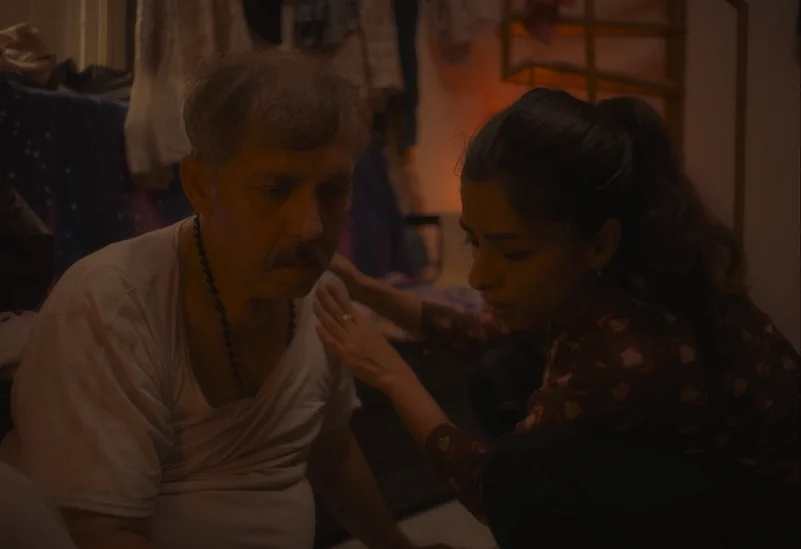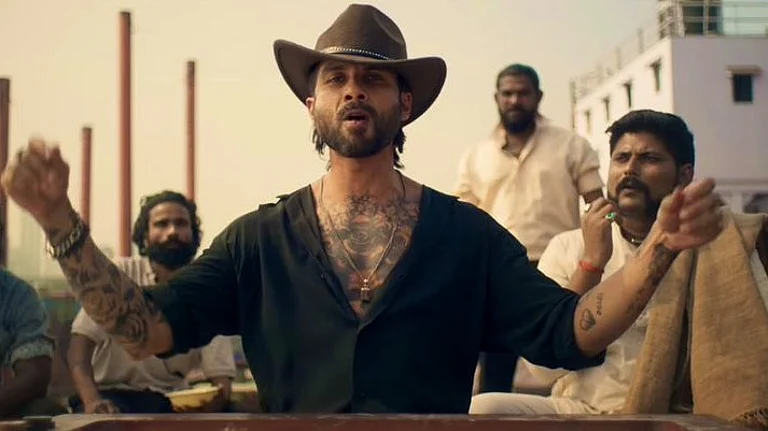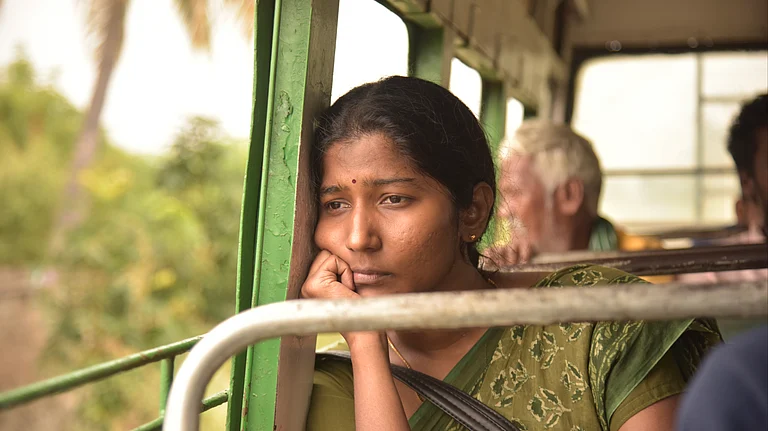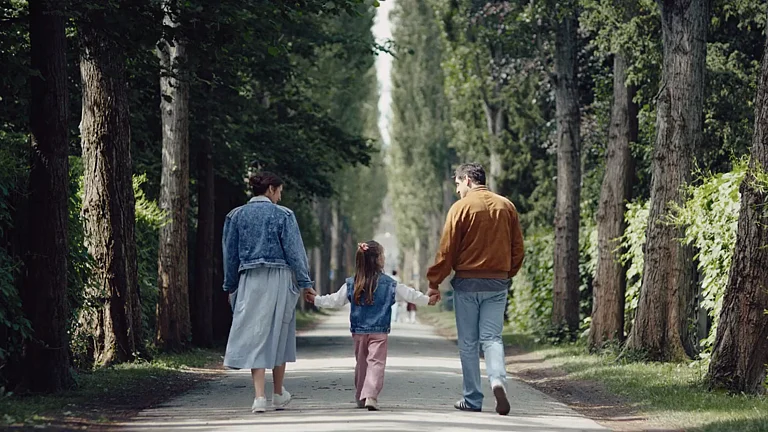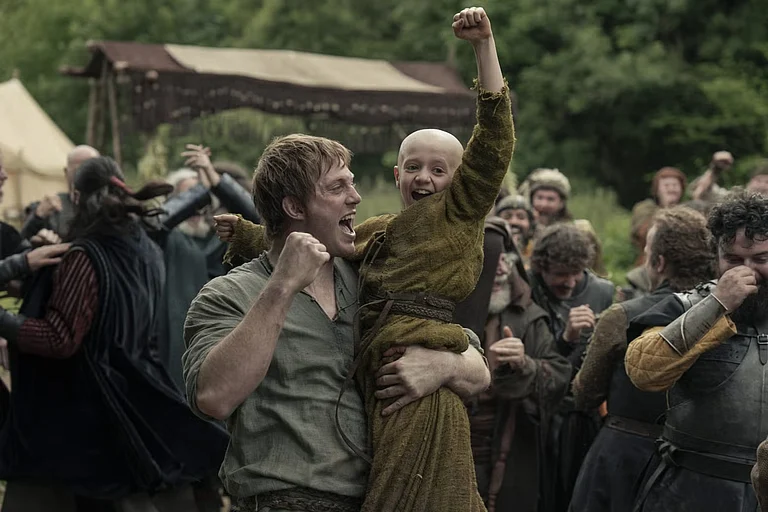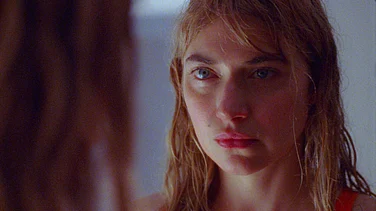
Abja And Her Pickled Eggs (2025) is directed and written by Rita Heer who is also known for Pushtaini (2024).
The film screened as a part of “Programme 2” in Dharamshala International Film Festival featuring films from India and UAE.
The film has since been selected for festivals such as Buffalo International Film Festival and Rhode Island International Film Festival.
Abja And Her Pickled Eggs (2025) directed by Rita Heer screened at the Dharamshala International Film Festival alongside films like Loop Line (2024) by Renuka Shahane and Darn (Rafu) (2025) by Arnav Utmani on October 30, 2025. Abja (Sugandha Garg) is a forty-year old aesthetician who has spent her days carving out women into whatever they wanted to be—hairless, sparkling and even dolled up for their weddings. Her days are spent catering to everyone else but herself. She patiently observes throughout the film whether her desires belong to her as much as her dislikes do. The answers are complicated and so are interpersonal relationships presented in front of her. She must decide whether to freeze her eggs or not.
Co-habiting with her is her elderly father. The relationship, though full of worry and caretaking, allows brief moments of respite as the television screen lights up their faces. But here too, there’s no complete escape—the laughing stock are women and crass humor about their bodies broadcasted for all to giggle over. This film presents a curious case of making the audience see what’s absent, even more than the surreal visuals presented on screen. Abja does not have a partner. In the subconscious realm, one can sense her inherent loneliness—not simply romantically, but owing to the absence of a parent, friend or even a confidante. She drags her massive bag (gage) against the loud clatter of Mumbai to the fertility hospital, all by herself.
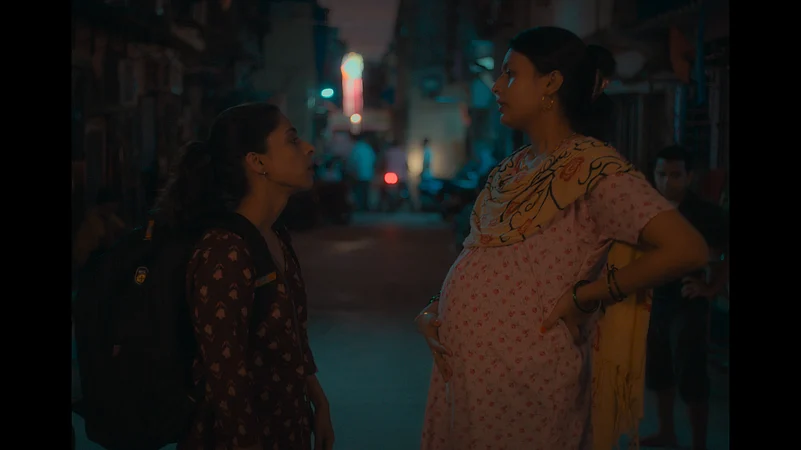
Heer navigates the delicate terrain of womanhood against the brief effervescence of life and passing time. The film takes a searing look at what it means to be a woman and the multitude of definitions it encompasses. More importantly, it asks if we ever stop performing—as mothers, as wives, as daughters and even as teenagers on the verge of personhood. The realization that it might never end, is for one to accept or reject, as is the choice presented to Abja.
What does it mean to be a mother? Is it eventually being unable to separate selfhood from the child? Is it about being unable to cope with the idea of never having one? Are women’s bodies simply there to be looked at, nitpicked at, altered and perform a singular function in the eyes of the world? The film sparks more questions in you than you can find answers to and that refreshing vulnerability tugs at the heart strings. Though some visuals within the film have been placed quite strategically to spoon-feed context and details, the film independently has enough substance to hold itself on its own.

Abja’s surreal visions, bathed in orange brine—envisioning herself and her eggs, paired with the stark reality of the external world—are rendered with tenderness and grace. She also seems to express a certain affinity for beaches or something vaster than herself, to assuage her doubts. The tranquil sound-mix and score of the film transforms these doubts into a very tangible emotional landscape, as many women might feel seen and heard through Abja’s character.
The fear of men is very real in a world where women have fought simply to exist independently. While marriage and companionship bring the joy of romance and intimacy, far too many women are either afraid of vulnerability or value their own bodies and peace of mind too much to risk it all. As people argue over the so-called “male loneliness epidemic,” there exists a much larger section of women who are “lonely” even within marriages—raising children and managing households alone, fulfilling familial and parental labor entirely by themselves, with no one to rely on. Independence or the rejection of romantic relationships varies from person to person, but community is inherent to survival, and women have long been profoundly lonely—Abja and Her Pickled Eggs really understands that.
Whether it is men or women—self-worth has the potential to be deeply tied to one’s reproductive health. The blame is initially always placed on women—for not being pregnant, for being pregnant, for not having a boy child, before men are even considered to have flaws of their own. This dichotomy of womanhood always leading to harm’s way gives a brief glimpse into the bleak contours of choice feminism. Abja never spells it out but asks herself—What happens to women who never marry or reproduce? Do they become “old cat ladies” with no one to love or hold?
The film witnesses her throughout like a spectator but it is only towards the end that it really embraces and gives her the clarity and conscience to know what she wants. It reflects the empathy of Heer and her virtual embrace to countless women like Abja, with no clarity of their own or those who ended up in situations they wish they could undo. The metaphor of the pickled eggs suggests the obvious—but also, in a different reading, could imply self-preservation and the distant orange-tinted joy within the life and future she sees for herself. Abja And Her Pickled Eggs presents a meditation on selfhood, loneliness and the ability to carve out one’s life without fear or judgement. The film reassures the cynic within and presents a story where it all works out in the best way imaginable.







